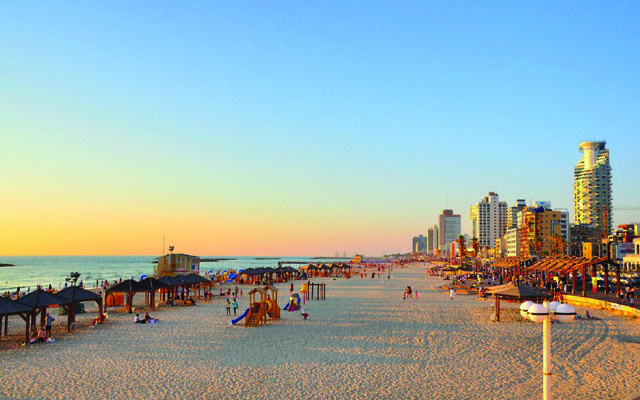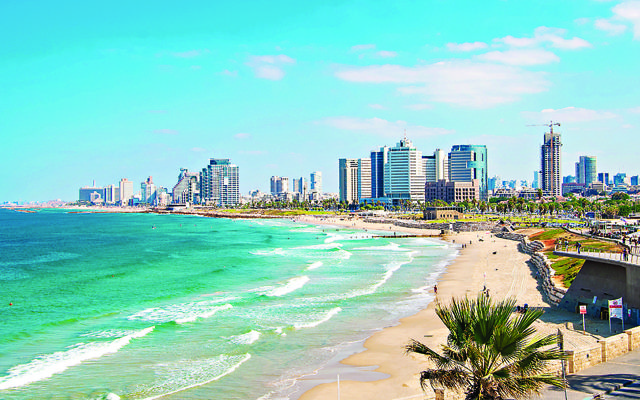Why Tel Aviv is Israel’s new ‘aliyah capital’
Some 3,000 new immigrants made Israel's bustling costal city their new home in 2016. With 1,748 cafes, bars and nightclubs – one for every 230 residents – it's clear to see why.
Meet Daniel Rubin, in many ways the new face of aliyah.
Originally from Los Angeles, Rubin, 27, moved to Israel a decade ago to study at a Jerusalem yeshiva. In the following years he served in the Israeli army and bounced back and forth between Israel and the U.S. for college and work.
But last month, he and his wife made aliyah. They settled in Tel Aviv so he could found a startup and they could enjoy the coastal city’s Mediterranean lifestyle. The couple were among about 3,000 new immigrants who made this city home in 2016, helping Tel Aviv earn the title as the “aliyah capital” of Israel for the third straight year.
“Tel Aviv is young, Tel Aviv is fun, Tel Aviv is exciting,” Rubin told JTA. “And I’m from L.A., so I love the beach.”
Rubin’s story reflects recent trends in aliyah.
As the wave of immigrants from the former Soviet Union has ebbed since the 1990s, aliyah has reached historic lows. Among those who have continued coming, a greater ratio have been from Western countries, and they have been more likely to choose to launch their Israel experience in big cities. Tel Aviv, the nation’s cultural capital, is now the favorite destination.
“Israel rescued millions of people from disadvantaged societies in Muslim countries and Eastern Europe,” said Sergio DellaPergola, a preeminent scholar of Jewish demography and migration. “But today, Diaspora Jews are overwhelmingly free people, mostly employed and mostly urban. There are no more rural Jews, no more persecuted Jews in ghettos, and therefore the whole migration balance is totally different. Aliyah is voluntary and based on Israel’s capability to offer employment and a good life.”
Israel was largely built by Jews escaping persecution. In the 19th and 20th centuries, Russian pogroms, European anti-Semitism and Nazi persecution helped povulate pre-state and early Israel. The country’s Jewish ranks then swelled with consecutive floods of Jews fleeing the Middle East from the 1950s, Ethiopia from the 1970s and the former Soviet Union countries from the 1990s.
In recent years, anti-Semitism in France and war in Ukraine have contributed to another uptick in aliyah, with Russian immigration hitting a 10-year high in 2016. But the broader trend since the early 1990s is downward. Aliyah from the former Soviet Union has largely run its course — after bringing almost a million immigrants to Israel — and overall numbers have reached lows only seen before in the 1980s, data from Israel’s Central Bureau of Statistics shows.
Meanwhile, immigration to Israel from Western countries — mostly Europe and the United States — has remained relatively steady. Therefore, new arrivals from the West now account for a much larger percentage of the total.
And apparently, Western Jews prefer big cities. Since 1989, no Israeli city has attracted more than 4 percent of new immigrants, with Tel Aviv — which is Israel’s second most populous city, with about half as many residents as Jerusalem — getting just 3 percent. But in 2016, Tel Aviv was the destination for 12 percent of new immigrants. The next three most popular cities were Jerusalem (10 percent), Netanya (9 percent) and Haifa (8 percent), according to the Ministry of Immigration.
In interviews with about a dozen people who had recently made aliyah to Tel Aviv or were considering doing so, the city’s startup scene and liberal, cosmopolitan lifestyle were cited as the biggest draws.
After a year in Jerusalem, Rubin and his wife, Talia, 23, moved to Tel Aviv. They loved Jerusalem, Rubin said, and the modern Orthodox community in the capital. But only in Tel Aviv could he launch The Pub Hub, his startup that turns bars into co-working spaces during the day. He opened the first location last month on Rothschild Boulevard, the city’s most happening thoroughfare.
“The vibe here — the energy and the opportunities — you just can’t find anywhere else,” he said.
Israel weathered the global recession better than most countries, and Tel Aviv is its financial and business center. The Israeli economy has grown by an average of nearly 4 percent annually over the past 13 years, and unemployment has fallen almost to 5 percent.
Much credit goes to Israel’s startups. According to Tel Aviv’s municipal government, the city is home to about 1,450 of the country’s 5,000 early-stage companies, which is more than one startup for every 300 residents — the highest ratio of any city in the world. Many of those startups look to reach the international market, providing plenty of jobs for native English speakers.
Groups that seek to attract young people to Israel have recognized the opportunity. Birthright Israel, which brings young Jews to visit the country free of charge, started an entrepreneurship program this year in Tel Aviv called Excel Ventures. And Nefesh B’Nefesh, the aliyah services provider, said it is opening a new office in the city next month to cater to the growing number of American, Canadian and British immigrants.
What those interviewed seemed to most appreciate was Tel Aviv’s lifestyle — the cafes, the nightlife and the beaches, plus the prevalence of English speakers. Tel Aviv boasts 1,748 cafes, bars and nightclubs — one for every 230 residents — along with some 1,500 restaurants, according to the municipality.
Uri Gafni, an official for Birthright’s Excel, summed up the sentiment.
“Tel Aviv embodies many of the things these young professionals are looking for when they come to Israel — they want the nightlife and the bars and the beach and this delicate balance between lifestyle and work in an environment that is liberal and open to a variety of people from all over the world,” he said.
“I think it’s easier for secular Jews around the world to relate to Tel Aviv than to Jerusalem. It’s much sexier for Jews to hang out in Tel Aviv, where they can finish the day and go drink a beer on Rothschild.”
Although Tel Aviv is said to attract a secular crowd, a growing number of Orthodox Jews like Rubin are coming to the city, according to Nefesh B’Nefesh officials. Seventeen percent of the immigrants they helped make aliyah in the past two years were Orthodox, the agency’s numbers show — similar to the community’s representation in all of Israel.
The Tel Aviv municipality has made quality-of-life investments in recent years, such as introducing bike sharing, renovating the central Dizengoff Square to make it more pedestrian friendly and creating open-air markets. At the same time, it has branded Tel Aviv as a “world city,” perhaps most effectively with Pride Week, which attracted more than 200,000 revelers and a handful of American celebrities this year.
A downside of all this choice, from an aliyah perspective, is that people can also choose to leave. According to DellaPergola, many immigrants to Tel Aviv return to their home countries at some point, or to move back and forth. Even those who build a life in Israel often get priced out of the city, where already high housing prices leaped 13 percent this summer from a year earlier. The internal migration rate from Tel Aviv to other parts of the country is among the highest of any city in Israel, said DellaPergola.
The good news for Tel Aviv, he said, is those who leave have in recent decades been replaced by new generations eager for their turn at life in the big city.

Thank you for helping to make Jewish News the leading source of news and opinion for the UK Jewish community. Today we're asking for your invaluable help to continue putting our community first in everything we do.
For as little as £5 a month you can help sustain the vital work we do in celebrating and standing up for Jewish life in Britain.
Jewish News holds our community together and keeps us connected. Like a synagogue, it’s where people turn to feel part of something bigger. It also proudly shows the rest of Britain the vibrancy and rich culture of modern Jewish life.
You can make a quick and easy one-off or monthly contribution of £5, £10, £20 or any other sum you’re comfortable with.
100% of your donation will help us continue celebrating our community, in all its dynamic diversity...
Engaging
Being a community platform means so much more than producing a newspaper and website. One of our proudest roles is media partnering with our invaluable charities to amplify the outstanding work they do to help us all.
Celebrating
There’s no shortage of oys in the world but Jewish News takes every opportunity to celebrate the joys too, through projects like Night of Heroes, 40 Under 40 and other compelling countdowns that make the community kvell with pride.
Pioneering
In the first collaboration between media outlets from different faiths, Jewish News worked with British Muslim TV and Church Times to produce a list of young activists leading the way on interfaith understanding.
Campaigning
Royal Mail issued a stamp honouring Holocaust hero Sir Nicholas Winton after a Jewish News campaign attracted more than 100,000 backers. Jewish Newsalso produces special editions of the paper highlighting pressing issues including mental health and Holocaust remembrance.
Easy access
In an age when news is readily accessible, Jewish News provides high-quality content free online and offline, removing any financial barriers to connecting people.
Voice of our community to wider society
The Jewish News team regularly appears on TV, radio and on the pages of the national press to comment on stories about the Jewish community. Easy access to the paper on the streets of London also means Jewish News provides an invaluable window into the community for the country at large.
We hope you agree all this is worth preserving.























